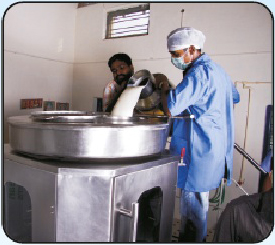
Most places in India, especially the villages in the country are suffering from acute power shortages. On top of that, natural calamities only add up to their misery. Some places do not have electricity for 24 hours a day and at times for 3-4 days a week due to power failure. This makes it difficult to run any business, especially a dairy business that deals with a highly perishable product like milk.
Sorin Grama, 44, CTO at Promethean Spenta Technologies Pvt. Ltd. was running a market study in rural India, along with his team, when he was introduced to this problem by Bangalore Dairy in 2007. He extended his working skills in energy storage and refrigeration to bring a product that could resolve this issue and help both the dairy business and the common people. This led to the creation of a magical product-‘Rapid Milk Chiller’.
Overview
While there is a similar product called Bulk Milk Chiller (BMC) already available in the market for a long time but the real challenge is that it runs on diesel generator. It makes it highly expensive both in capital and operating cost, specially in India. This is why many BMCs are not available at the village levels.
The Rapid Milk Chiller has been designed from the ground level for the Indian dairy industry. The system works on thermal energy backup technology and is controlled by an embedded control and acquisitions device. Thus, it does not need any diesel generator backup and allows the milk to cool rapidly, thereby eliminating its chances of getting perished.
The work on this product was started in 2007 and now in 2013 it is finally in the production stage.
How it works?
Sorin’s team has developed this chiller into a smart self-controlled FPGA-based system. It allows remote monitoring of the system status through cellular technology, and has an on-board control system which works based on the inputs from a custom sensor interface board.
For starters, this system enables remote monitoring of the system operation via short messaging service (SMS). This helps them to quickly determine if the system is down and to have a repair technician sent quickly. It also allows them to gather some information essential for their customers like operating cost, amount of milk chilled, etc. This being a mission critical application, connectivity is a key feature for the operation of such remote applications.

The communication part is done via SMS using a proprietary communication protocol. The user can remotely check any operating parameter of the machine, by sending a simple SMS message such as “status?”. The user is also able to remotely control the machine by sending an SMS — which enables rapid updating of running parameters such as temperature setpoints, etc.
The control systems also monitor and control temperatures. These temperatures are acquired using a custom sensor interface board designed to control the system. To facilitate control, the team at Promethean used a few proprietary software algorithms running on LabVIEW RT and LabVIEW FPGA on an embedded control and acquisitions device like the NI sbRIO-9606 board. For the control hardware, they uses Solid State Relays (SSRs) claiming that they are more reliable.
The Rapid Milk Chiller has a thermal battery backup system that solves the problem of the unreliable electricity. This battery is not an electrical battery, however, it is thermal and stores thermal energy. To be specific, it stores energy in the form of ice, something that is ideal for refrigeration applications because energy is required for the transition of a substance from one state to the other (solid to liquid and vice-versa).
The thermal battery is charged using the electricity that is available (at least 6 hours per day is always available in villages). The charging is done by a refrigeration compressor that cools a fluid and makes ice. Once the battery is charged, the ice formed is available to chill the milk whenever needed. Milk needs to be chilled at two specific times a day (early morning and early evening). The battery is not used when electricity is available, however, if there is no electricity then the battery seamlessly turns on and continues chilling the milk.
Besides the battery, the Rapid Milk Chiller system includes components such as a rapid heat exchanger for rapidly cooling milk and a smart control system for monitoring and controlling the entire system. This is basically a turnkey system that can be installed in any village in India. We are selling these to dairies who want to collect high quality milk or want to expand to more remote villages. The dairies will install the systems in villages where farmers can use them.







This is indeed a good innovation but not economical viable for a dairy farm use. This is a total waste of money . Please go through this article why.
If you look into the financial aspect of putting such a huge money for this equipment. A good quality bulk milk cooler of a branded company cost 2 lakh & here you are paying 6 lakh for the same capacity of machine. U are paying 4 lakh extra.
Bulk cooling machine takes 2.5 hours max to chill the milk,so you chill the milk 2.5 hours in the morning and 2.5 morning in the evening . In real condition you have 50% power availability. each day you run you generator for 2.5 hours & u need 2.5 liter diesel , that consume 1 liter /hr diesel @6o / liter so in months your expense comes =2.5*60*30= 4500 & you need to have generator at dairy farm for yr emergency back up so this is not extra expense.
if you invest this 4 lakh money in cow , you will get 7 cow @60000 each . if you make min 4000 /cow/month you are making 28000 a month .
So thing if you really need this machine, be smart and invest money wisely but not in this machine.
On top of the that while generator is on you can make use the same time for milking the cow with milking machine as well others works at dairy farm as per your need.
SO if you are buying this machine, this is a total waste of money .